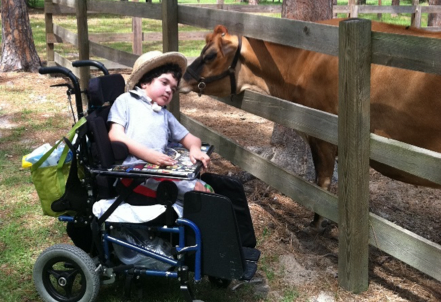Cultural Competence Resources
As the number of children and youth with deafblindness from culturally and linguistically diverse backgrounds continues to grow, educators and others who provide services to them and their families are expected to demonstrate awareness of cultural differences and use culturally responsive practices that respect diversity (Bowen, 2017). The resources on this page can help technical assistance (TA) providers and educators increase their knowledge of these practices to inform their teaching, TA, and partnerships with families.

General Multicultural
National Center for Cultural Competence
This site, which focuses on health care settings, includes well-reviewed articles and resources to inform policy. They have a number of excellent resources:
- Cultural Competence Curricula Enhancement Module Series
- Children with Disabilities & Special Health Needs and their Families
Achieving Cultural and Linguistic Competence in Information Dissemination Activities,
Describes a process for the publications development that considers cultural and linguistic differences and representations. Guidelines are intended as a point of reference for anyone writing or producing information for any audience.
Building Partnerships: Key Considerations with Engaging Underserved Communities
Introduces guiding principles of community engagement with underserved communities and suggests specific strategies for county mental health departments to nurture sustained partnerships with communities.
CEEDAR Center Culturally Responsive Teaching
Offers themes and practices to guide teacher preparation professionals in the development of appropriate culturally responsive teaching (CRT) content.
Developing Cross-Cultural Competence: A Guide for Working with Children and Their Families
This textbook for EI practitioners has a wealth of information on cultural competence and chapters on nine specific cultural groups. You would need to purchase it (there are used copies on Amazon) or get it from a library (for those affiliated with a university, the library might have a copy, and if not, they could easily get one through interlibrary loan).
Developing Culturally Responsive Approaches to Serving Diverse Populations: A Resource Guide for Community-Based Organizations
From the National Research Center on Hispanic Children and Families this guide is designed to help organizations find relevant resources for developing and implementing culturally competent programs in increasingly diverse communities. It includes information on choosing, adapting, or developing interventions, conducting needs assessments, selecting appropriate measures, and collaborating with other organizations.
Diversity & Inclusion Toolkit Website
Produced by the Association of University Centers on Disabilities, the toolkit is designed to serve as a foundation for a national effort to enhance diversity, inclusion, and cultural and linguistic competence; cultivate partnerships; respond to increasingly diverse communities across the country; and develop strategies for continuing efforts to better serve diverse populations.
Family Partnerships and Culture
This manual from the California Department of Education is aimed at early childhood education program personnel, but has a lot of great information about cultural competence when working with families. It has a clear layout and straightforward style, and the text is broken up by vignettes that illustrate some of the points.
Minority Parent & Community Engagement: Best Practices and Policy Recommendations for Closing the Gaps in Student Achievement
Produced by the National Education Association, this publication looks at improving student achievement and helping close the achievement gap by increasing the inclusion and engagement of parents of color in their children’s education. Includes practices for engaging minority parents and strengthening parent engagement.
Using Outreach to Increase Access
Produced by the Center for Community Health and Development at the University of Kansas, this online toolkit demonstrates how to implement an outreach service to expand access to health services, practices, and products. Examples answer the questions of what outreach is, when is it needed, and give suggestions of common methods of outreach and creative and nontraditional ideas for implementation. Also touches upon cultural awareness.
Working with Culturally Diverse Families (Training Videos)
The PACER Center has developed a series of training videos aimed at educators and other service providers that discuss how to work with diverse families. They cover a range of topics including general considerations, outreach tips, and specifics of health.
Resources for Specific Populations
National Research Center on Hispanic Children and Families
The Center is a hub of research to improve the lives of low-income Hispanics in three areas: early care and education, healthy marriage and responsible fatherhood, and poverty and economic self-sufficiency. A key goal is to build capacity within the research, policy, and practice communities, including training an increased number of young scholars focused on low-income Hispanic children and families.
Cultural Awareness and Connecting with Native Communities
Written for Parent Centers and offering information on Tribal etiquette and culture. Includes suggestions for interacting with Native communities in ways that enhance communication and connectedness.
Culture Card: A Guide to Build Cultural Awareness
General briefing to enhance cultural competence while providing services to American Indian/Alaska Native communities.
Culture Counts: Engaging Black and Latino Parents of Young Children in Family Support Programs
An overview of family support programs. Identifies effective features and strategies for reaching and engaging black and Latino families to support young children’s development.
Introducing Your Parent Center to American Indian Communities
Written expressly for Parent Centers, suggests several “first steps” in approaching and building relationships or strengthening partnerships with Native American and Alaskan Native communities.
One Sky Center
One Sky Center is a National Resource Center for American Indian and Alaska Native Health, Education, and Research. Provides training and technical assistance to American Indian and Alaska Native programs.
Reaching & Engaging with Hispanic Communities: A Research-Informed Communication Guide for Nonprofits, Policymakers, and Funders
Focusing on the Hispanic community and the socioeconomic struggles related to a majority of that population, this guide serves to help service providers and educators serve Latino children and their families by building communication strategies.
Reference
Bowen, S. K., & Correa-Torres, S. M. (2017). Understanding the communication needs of culturally and linguistically diverse students who are deafblind. Perspectives of the ASHA Special Interest Groups, SIG 12, 2(Part 3), 81-88.